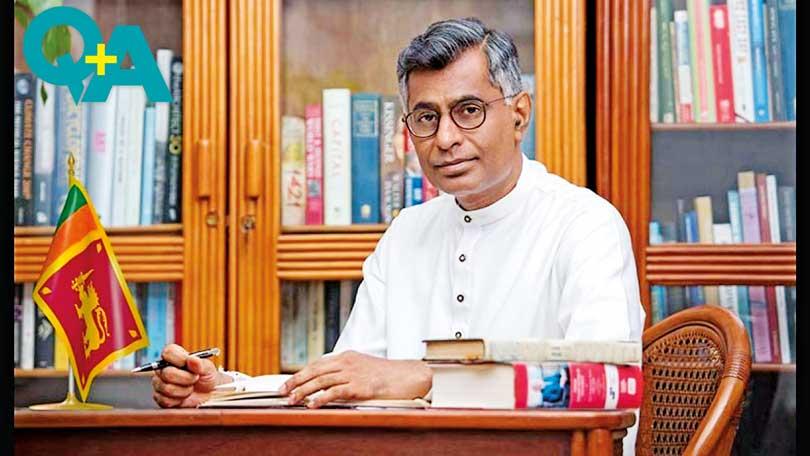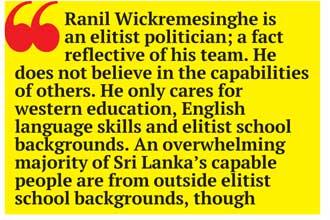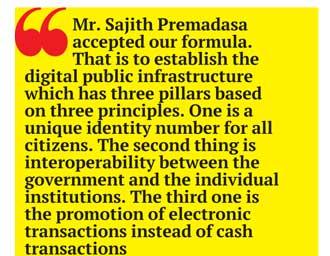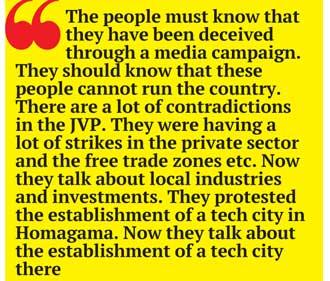Reply To:
Name - Reply Comment

 United Republican Front (URF) Leader MP Patali Champika Ranawaka who is backing Presidential Candidate and SJB Leader Sajith Premadasa shares his views on current political developments ahead of Saturday’s poll. He fears whether this will be the last democratic election that will be conducted in Sri Lanka.
United Republican Front (URF) Leader MP Patali Champika Ranawaka who is backing Presidential Candidate and SJB Leader Sajith Premadasa shares his views on current political developments ahead of Saturday’s poll. He fears whether this will be the last democratic election that will be conducted in Sri Lanka.
Excerpts:
Q: You were a harsh critic of Sajith Premadasa. But you sided with him at the last minute to back him at the presidential elections. How did you take such a U-turn?
It is a policy matter. We published a pragmatic action plan and handed it over to all the political leaders including the SJB Leader. He is the only credible leader who accepted it totally. We entered into a MoU with him. On the one side, we see a hardline Bolshevik, left wing party emerging on a populist wave. We believe we cannot resolve our  problems through it. It will be an economic disaster. That could be the death-knell of democracy.
problems through it. It will be an economic disaster. That could be the death-knell of democracy.
Bolshevik-type revolutionaries in the world are fracturing the states. They leave no room for credible elections or democratic processes. On the other hand, Mr. Ranil Wickremesinghe is not a credible, liberal leader. Liberalism means believing in competitiveness, meritocracy, market economy, the rule of law and democratic governance. Ranil Wickremesinghe is an elitist politician; a fact reflective of his team. He does not believe in the capabilities of others. He only cares for western education, English language skills and elitist school backgrounds. An overwhelming majority of Sri Lanka’s capable people are from outside elitist school backgrounds, though.
He is an autocrat who is even challenging Supreme Court rulings. He promoted so-called cronyism.
Q: Your candidate talks about a social market economy. He promises to dole out many things. Where can he find the money?
 Traditional economists argue for tax hikes and cutting down government’s expenses by way of scaling down the government sector. But, Mr. Sajith Premadasa accepted our formula. That is to establish the digital public infrastructure which has three pillars based on three principles. One is a unique identity number for all citizens. It will reflect in our identity cards, bank accounts, passports, land deeds etc. The second thing is interoperability between the government and the individual institutions such as the Inland Revenue Department, Identity Card Office, Passport Office, Customs etc. The third one is the promotion of electronic transactions instead of cash transactions.
Traditional economists argue for tax hikes and cutting down government’s expenses by way of scaling down the government sector. But, Mr. Sajith Premadasa accepted our formula. That is to establish the digital public infrastructure which has three pillars based on three principles. One is a unique identity number for all citizens. It will reflect in our identity cards, bank accounts, passports, land deeds etc. The second thing is interoperability between the government and the individual institutions such as the Inland Revenue Department, Identity Card Office, Passport Office, Customs etc. The third one is the promotion of electronic transactions instead of cash transactions.
We are for an open procurement process. Then, people will know the real prices of imported food items, medicines, fuel and fertilizer. Then no one can siphon off profits. It will create a conducive atmosphere for businesses with transparency.
Q: How much money or revenue can be generated in this manner by developing digitization according to your plan?
If you conduct government services such as issuing e -passports, e - driving licenses based on online transactions, it can be done. All transactions must be done on electronic platforms. There are various platforms. These platforms should be integrated into a single platform so that cash transactions will not play a big role.
Q: You mean doing away with the cash economy?
Yes, that is to do away with the cash economy to opt for e-rupee. First we should introduce a digital wallet. That way, within two years’ time, we can establish this system and capture the market which is not now accounted for. Then, we can double the revenue target.
Q: Currently the target is to achieve a revenue target of 15 percent of the Gross Domestic Production (GDP). Is it possible?
Yes we will achieve it. We are planning to double the revenue level to cross the mark of eight trillion rupees.
Q: You are not a member of SJB. Yours is only in alliance with SJB. How receptive are they to your proposals?
They are receptive. They have included it in their manifesto too.
Q: When we listen to speeches of members of the SJB hierarchy, we see a lot of policy contrasts. Some say they will amend the agreement with the International Monetary Fund (IMF) whereas others say they will give it a human face. What is the actual position?
The IMF programme is based on the debt sustainability analysis. There are targets to be achieved. The way of achieving these targets can be different. The IMF wants to raise the revenue level to 15 percent of GDP. We can impose taxes on essential items to achieve it. Or else, we can net those who are evading payment of taxes. There are various other means too. They are focusing on our debt sustainability to cut our debt burden. The President resolved this problem by burdening the common people. We target those responsible for the economic carnage and those who are siphoning off huge profits. That is why we are talking about giving a human face to the IMF.
Q: How certain are you about victory at this election?
The people must know that they have been deceived through a media campaign. They should know that these people cannot run the country. There are a lot of contradictions in the JVP. They were having a lot of strikes in the private sector and the free trade zones etc. Now they talk about local industries and investments. They protested the establishment of a tech city in Homagama. Now they talk about the establishment of a tech city there. They protested against the Colombo Port City. Now they talk about investments there. They protested against the wind power project to be implemented by Adani. Now they talk about competitive bidding for the selection of investors to carry out such projects.
Q: Will you be reviewing the connectivity projects with India?
Connectivity projects are something different. It was proposed by the Asian Development Bank (ADB) 30 years ago. It is a very, very old concept. The development of the Trincomalee oil tank farm and the Sampur power plant are there. These are at least 20 years old concepts. As far as the green energy field is concerned, the new Act has one positive component - competitive bidding instead of unsolicited proposals.
Q: What will you do with the pieces of legislation introduced by the government such as the Economic Transformation Act?
In the Act, a target has been set to achieve exports growth to be 25 percent of the GDP. It is to double the current volume. That is practically impossible to achieve within the stipulated time frame. Then, we have to amend the law for sure. There are unrealistic targets set out in the Act.
Q: There are at least three main candidates in the fray. Now your candidate and the President take on each other, but they don’t take on National People’s Power (NPP) candidate Anura Kumara Dissanayake as such. Have you conceded defeat?
Mr. Ranil Wickremesinghe is doing a damaging thing to the liberal democratic camp. He crushed the Frontline Socialist Party (FSP) to support the JVP. He was not arresting the JVP leaders who tried to set ablaze the parliamentary complex. It was an attempt for a heinous crime. But he was not acting. There are various examples we can cite. It is a personal grudge between Sajith Premadasa and President Ranil Wickremesinghe.
Q: How has it impacted Mr. Premadasa’s campaign?
There is an impact. RW (The President) is not going to win. I still cannot fathom why such an experienced person is contesting this time knowing the ground reality very well. His ulterior motive is to defeat Sajith. It is a personal grudge. The bonhomie between RW and Anura is nothing new. Anura even tried to sabotage the war effort during the tenure of Mahinda Rajapaksa. This is not a normal election. This could be the last democratic election in this country, being determined by a wave of populism created on social media. It was the similar wave in 2019 when a deliberate social media campaign was launched to mislead the public and promote Gotabaya Rajapaksa as the saviour of the nation. The country went bankrupt. This time, the country will not be bankrupt but the entire democratic system that has remained since 1931 will be ruined.
Q: If you go by the NPP manifesto, it is no longer based on Marxism though you brand it as a leftist party. What is your view?
Their core party of the NPP is JVP. They have not yet announced that they will give up Marxism. They still believe in revolution. What is the guarantee that they will deviate from Marxist ideology to this manifesto?